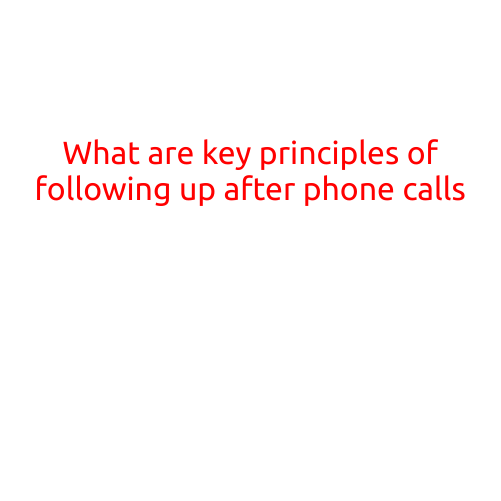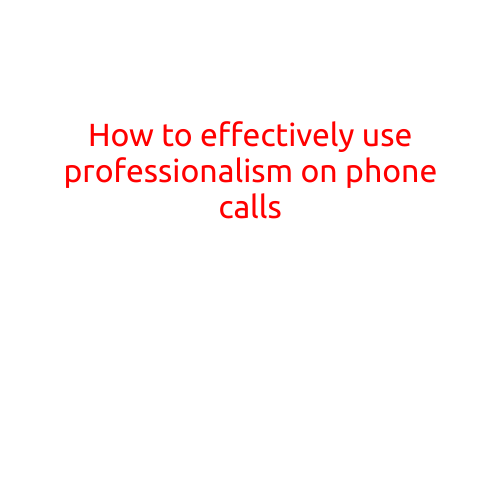
What are the Key Principles of Following up after Phone Calls?
Making phone calls is an essential part of any sales, marketing, or customer service strategy. However, follow-up is often overlooked, which can lead to missed opportunities and lost connections. In this article, we will explore the key principles of following up after phone calls to ensure that you get the most out of your conversations and build strong relationships with your customers.
Principle 1: Set Clear Expectations
When making a phone call, it is crucial to set clear expectations with the person you are speaking to. This means being transparent about the purpose of the call, the topics you want to discuss, and the timeframe for follow-up. By setting clear expectations, you can ensure that the conversation stays focused and productive.
Principle 2: Take Notes and Follow Up
Taking notes during the call is essential for remember important details, follow up on commitments, and track progress. This also shows the person you are speaking to that you are interested in what they have to say and value their input. After the call, be sure to follow up on any commitments or action items you discussed to demonstrate your professionalism and attention to detail.
Principle 3: Prioritize Timely Follow-Up
Time is of the essence when it comes to follow-up. The sooner you follow up after a phone call, the more likely you are to keep the conversation going and close deals. Aim to follow up within a few days to a week, and make sure your follow-up is prompt and relevant to the previous conversation.
Principle 4: Be Proactive, Not Reactive
Rather than waiting for the other person to reach out, be proactive in your follow-up efforts. This means sending a follow-up email or making another phone call before they have a chance to contact you. By being proactive, you can stay in control of the conversation and keep the momentum going.
Principle 5: Keep it Simple and Concise
When following up, keep your messages simple and concise. Avoid sending long, rambling emails or making lengthy phone calls. Instead, focus on the key takeaways from your previous conversation and reiterate your value proposition. This will help keep the conversation focused and prevent confusion.
Principle 6: Be Personal and Professional
When following up, it is essential to maintain a professional tone while still being personal and friendly. Avoid being too pushy or aggressive, as this can be off-putting. Instead, focus on building rapport and trust with the person you are speaking to.
Principle 7: Respect Boundaries
When following up, it is essential to respect the boundaries and schedule of the person you are speaking to. Avoid calling at inconvenient times or bothering them with repeated messages. Instead, focus on finding a mutually beneficial time to follow up and communicate.
Principle 8: Continuously Improve
Finally, continuously improve your follow-up process by tracking your progress, gathering feedback, and adapting to new situations. By continuously improving your follow-up strategy, you can maximize your results and build stronger relationships with your customers.
In conclusion, following up after phone calls is a crucial part of any sales, marketing, or customer service strategy. By incorporating the key principles outlined in this article, you can ensure that you get the most out of your conversations and build strong relationships with your customers. Remember to set clear expectations, take notes and follow up, prioritize timely follow-up, be proactive, keep it simple and concise, be personal and professional, respect boundaries, and continuously improve.





